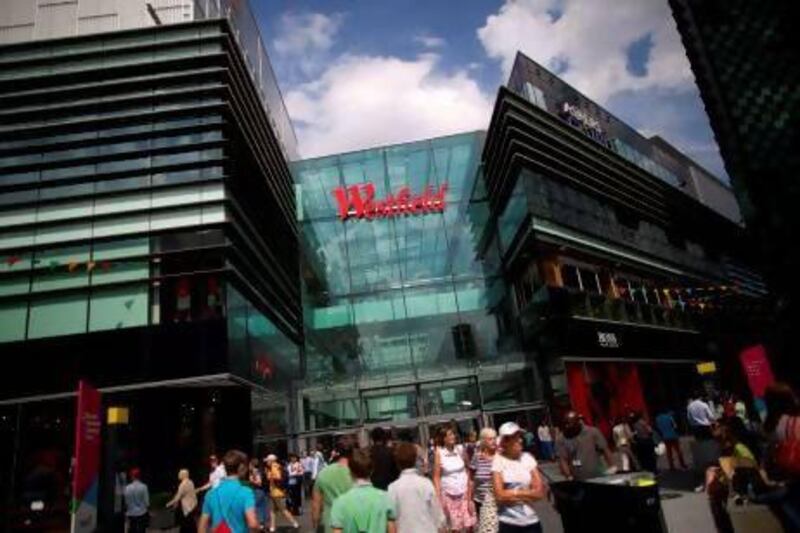LONDON // It is the fish that really annoy Hafiz Khalid.
Erected as part of the multibillion-pound development project that accompanied last year's Olympic Games, the fish are the 250-metre long Stratford Shoal, a gold and green leaflike titanium sculpture, raised to hide the concrete behemoth that is Stratford Centre, the East London shopping complex where Mr Khalid has a clothes stall.
To Mr Khalid, the fish are a waste of money.
"I don't understand what they are for," the 29-year-old said with some exasperation. "And I don't like them."
The British government says the Olympics, which started a year ago today, were an unmitigated success that poured billions into the economy and revitalised previously deprived areas such as Stratford, home to what is now the Queen Elizabeth Olympic Park.
The mayor of London, Boris Johnson, on Thursday went so far as to call the Olympic legacy an "astonishing economic story of regeneration" in poor parts of East London such as Stratford.
But that is not a story Mr Khalid recognises. To him, it was business as usual as soon as the Games finished. And now, "business is going down".
Economists paint a more complex picture.
In a report on the Olympic legacy published last week, the government claimed hosting the Games has injected £9.9bn (Dh55.88bn) into the British economy so far, comfortably covering the £8.7bn it cost the public coffers to play host nation.
But that version is "something of an exaggeration", said Gavin Poynter, an economist with the University of East London who has written extensively on urban development in London, and co-edited a book on Olympic cities.
In fact, if one takes into account what would have happened anyway in terms of investment in the area, Mr Poynter said, "at a generous level" one would halve the government figure and get nearer to the truth.
That takes some considerable shine off the government's boasted Olympic legacy, but is not to be sniffed at. Investment in infrastructure, Mr Poynter noted, left Stratford not only better connected to London but a more attractive place to visit.
The shoal sculpture that so annoys Mr Khalid was part of a £13.5 million development project of the Stratford Centre. Just across Stratford International, the rail station that was completely refurbished ahead of the Games, now lies the vast new Westfield shopping complex, one of the largest urban shopping areas in Europe.
Westfield created about 8,000 jobs in the area. It was a "godsend", said Jean Smith, 27, a shop assistant. Ms Smith is originally from Ireland but has spent 11 years in Stratford. Most of those years she had been unemployed, she said on Thursday.
"Without this, I'd still be out of a job. I am very happy with what's happened."
But "this" - a high-end retail haven of sushi chain restaurants, Armani clothes shops and Omega watch outlets - is out of a shop assistant's range. It stands in marked contrast to the burger chains, 99-pence shops, discount supermarkets and market stalls of the older Stratford Centre.
For all its shiny new buildings, four in 10 children still grow up in poverty in Newham Borough, of which Stratford is a part. According to The Economist, it is the second-most deprived borough in Britain.
Jobs were created, said Mr Poynter. But like the jobs that were lost with the almost 250 small business enterprises that gave way to the Olympic park, they are on the low wage scale end, if in retail rather than manual labour.
Mr Poynter said he was pessimistic about the long-term benefits of the Olympics for the local population in Stratford, even with plans for more affordable housing.
"In the longer term it seems to me that the types of development that are happening will inevitably create the kind of gentrification that has occurred in other parts of London," leaving the area out of reach of the traditional working class that makes up the bulk of the population.
These are still early days, and Mr Johnson has cautioned against cynicism.
The 2012 Games were a huge sporting and entertainment success and eventually won over sceptical Londoners, who had feared the worst for the creaking infrastructure of their city, he said.
Cynics then were forced to eat large helpings of "humble pie", Mr Johnson said. The same would apply now, he promised.
But like the government's best-of-all-possible-worlds figures, the Olympic legacy remains aspirational, in that it closely resembles Stratford International Station, which, despite its name, serves no destination outside England.






